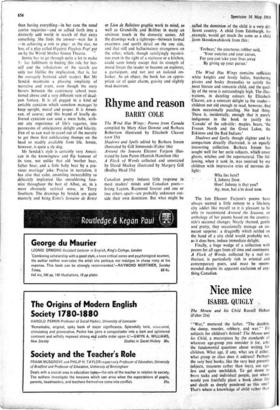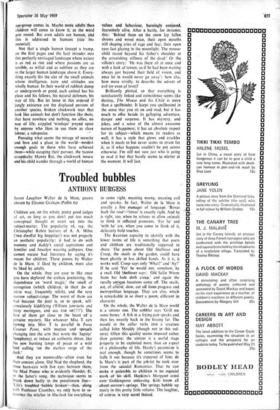Nice mice
ISABEL QUIGLY
-The Mouse and his Child Russell Hoban (Faber Hs)
"War," muttered the father. "The dustbin, the •dump, murder, robbery, and war."' Fit subjects for children's fiction? The Mouse and his Child, a masterpiece by the standards of whatever age-group you consider it for, asks the fundamental questions about writing for children. What age, if any, what sex if either, what group or class does it address? Perhaps the very best books, like the very best presents (objects, treasures rather than toys), are age- less and quite unchildish. To get down to brass tacks and individual people, just where would you fruitfully plant a book about life and death as deeply pondered as this one? That's where a knowledge of child rather than
age-group comes in. Maybe more adults than children will come to know it, as the word gets round. But even adults are human, abd this is addressed to humans (size im- material).
Not that a single human (except a tramp, on the first pages and the last) intrudes into this perfectly envisaged landscape where nature is as red as riot and where passions are as terrible, as wilful and as sublime as they are in the larger human landscape above it. Every- thing exactly fits the size of the small animals whose intelligence, taste and attitudes are wholly human. In their world of rubbish dump or undergrowth or pond, each animal has his place and his fellows, his natural defences, his way of life. But let loose in this ordered if jungly existence are the displaced persons of another species, broken clockwork toys that look like animals but don't function like them, that have nowhere and nothing, no allies, no way -of life; crippled `windups' preyed upon by anyone who likes to use them as slave labour, a subspecies.
Pursuing what seems the mirage of security and love and a place in the world—modest enough goals to those who have achieved them—while escaping their pursuer, the tycoon scrapdealer Manny Rat, the clockwork mouse and his child wander through a world of human
values and behaviour, burningly conjured, fearsoinely alive. After a battle, for instance, this: 'Behind them on the snow lay fallen shrews and wood mice, their open mouths still shaping cries of rage and fear, their open eyes fast glazing in the moonlight. The mouse- child stared beyond his father's shoulder at the astonishing stillness of the, dead.' Or the villain's entry: `He was there all at once and with a look of tenure, as if he had been waiting always just beyond their field of vision, and once let in would never go away': how else, how more vividly, to describe the advent of evil (or even of love)?
Brilliantly plotted, so that everything is satisfactorily linked and coincidence seems like destiny, The Mouse and his Child is more than a spellbinder. It keeps you spellbou'nd in the sense that you sit on and read, but it has much to offer beside its galloping adventure, danger and suspense. It has mystery, and jokes, and a sense of the almost awesome nature of happiness; it has an absolute respect for its subject—which means its readers as well; it has a style that glows and crackles when it needs to but never seems to strain for it, as if what happens couldn't be put across otherwise. I'm still not sure just who is going to read it but that hardly seems to mhtter at the moment. It will last.







































 Previous page
Previous page